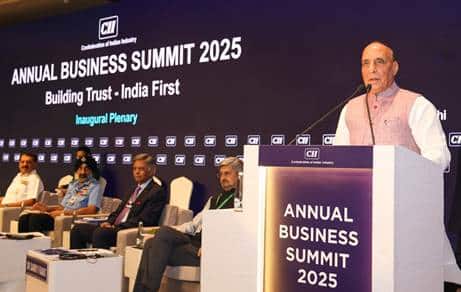Make-in-India Contributed Significantly to Operation Sindoor and AMCA Execution Model

“Make-in-India” is being hailed as a cornerstone of national security, particularly in the context of India’s recent military operations. During the Confederation of Indian Industry (CII) Annual Business Summit held in New Delhi on May 29, 2025, Defence Minister Rajnath Singh emphasized the significance of the Advanced Medium Combat Aircraft (AMCA) program. This initiative marks a pivotal opportunity for the private sector to collaborate with public sector companies on a major defense project, enhancing India’s indigenous defense capabilities.
AMCA Program: A Bold Step Forward
Rajnath Singh described the Execution Model for the AMCA program, which aims to develop fifth-generation fighter aircraft, as a decisive move that will elevate the domestic aerospace sector. The project plans to create five prototypes, paving the way for series production. Singh characterized this initiative as a significant milestone in the Make-in-India initiative, underscoring its importance in strengthening the country’s defense infrastructure. He noted that the successful implementation of this program will not only enhance India’s defense capabilities but also foster innovation and growth within the aerospace industry.
The Defence Minister highlighted the critical role of indigenous systems during Operation Sindoor, asserting that the Indian Armed Forces’ effective actions against terrorism in Pakistan and Pakistan-occupied Kashmir (PoK) were made possible by the country’s strengthened defense capabilities. He stated that the Make-in-India initiative is essential for both security and prosperity, demonstrating India’s ability to penetrate enemy defenses. Singh emphasized the importance of coordination and restraint in military operations, indicating that while significant damage was inflicted on terrorist hideouts and military bases, there was also a commitment to measured responses.
Redefining India’s Strategy Against Terrorism
Rajnath Singh articulated a new approach to counter-terrorism, asserting that India has redefined its strategy and response to threats. He claimed that Pakistan has recognized the unsustainable nature of its terrorism operations, which could lead to severe consequences. The Defence Minister mentioned that India’s engagement with Pakistan has been recalibrated, with future dialogues focusing solely on terrorism and PoK. He reiterated that PoK is an integral part of India, expressing confidence that those who were separated from India will eventually return.
The Minister emphasized the government’s commitment to the principle of “Ek Bharat Shreshtha Bharat,” highlighting the deep connections many people in PoK have with India. He called for a collective effort from all stakeholders, including innovators and manufacturers, to prioritize national interests over individual company gains. Singh urged the Indian industry to align its efforts with the broader national mission, stating that safeguarding national interests should take precedence over securing corporate interests.
India’s Economic Growth and Global Standing
During his address, Rajnath Singh celebrated India’s economic achievements under Prime Minister Narendra Modi‘s leadership, noting that the country has emerged as the fourth-largest economy globally. He emphasized that this growth is not merely quantitative but also reflects the increasing trust the world places in India. Singh pointed out that India has transitioned from being a consumer of defense technology to becoming a producer and exporter, which he views as a testament to the nation’s capabilities.
The Defence Minister highlighted the remarkable progress made in the defense sector over the past decade. He reported that defense production has surged from approximately Rs 43,000 crore to over Rs 1,46,000 crore, with significant contributions from the private sector. Additionally, defense exports have skyrocketed from around Rs 600-700 crore to a record Rs 24,000 crore, with Indian defense products reaching nearly 100 countries. Singh acknowledged the vital role of over 16,000 MSMEs in the defense supply chain, which not only bolster self-reliance but also provide employment opportunities for many.
Future of Warfare and National Aspirations
Rajnath Singh asserted that India is not only advancing in traditional defense capabilities but is also preparing for new-age warfare technologies. He highlighted the country’s progress in areas such as Artificial Intelligence, Cyber Defense, Unmanned Systems, and Space-Based Security, which are gaining recognition on the global stage. Singh expressed optimism that India has the potential to become a hub for engineering, high-precision manufacturing, and future technologies.
The Defence Minister concluded by emphasizing the importance of collective efforts between the government and industry to realize India’s aspirations of becoming a developed nation by 2047. He stressed that a nation’s strength is not solely measured by economic indicators but also by the confidence it inspires in its citizens and the global community. Singh reiterated that trust is built on a nation’s ability to protect its interests and ensure the safety of its citizens, fostering a sense of security for the future.
Observer Voice is the one stop site for National, International news, Sports, Editor’s Choice, Art/culture contents, Quotes and much more. We also cover historical contents. Historical contents includes World History, Indian History, and what happened today. The website also covers Entertainment across the India and World.
Follow Us on Twitter, Instagram, Facebook, & LinkedIn

